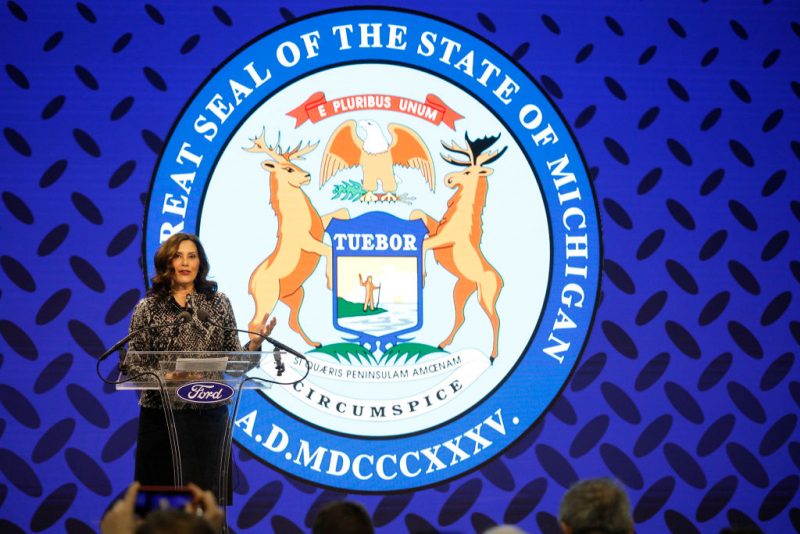
OAN’s Elizabeth Volberding
5:00 PM – Wednesday, September 6, 2023
House Energy and Commerce Committee Republicans, directed by Chair Cathy McMorris Rodgers, communicated with Ford Motor Company’s president and CEO James Farley, expressing concern about a new partnership with Chinese-owned Contemporary Amperex Technology Co., Limited (CATL).
The collaboration involves building lithium iron phosphate batteries in the United States.
Earlier this year, Ford announced that the company would invest $3.5 billion in order to construct a lithium iron phosphate battery plant in Marshall, Michigan.
Company representatives said that its purpose would be to supply growing electric vehicle (EV) manufacturing and create 2,500 new jobs.
The battery cells will be manufactured using Chinese company CATL’s technology, which was described in the announcement.
26 Republicans on the House Energy and Commerce Committee have been in the process of examining the relationship between the multibillion-dollar American automaker and CATL.
In a letter sent to the Ford CEO on Friday, Republican lawmakers, led by Energy and Commerce Chair Cathy McMorris Rodgers (R-Wash.) and Energy and Commerce Oversight Subcommittee Chair Morgan Griffith (R-Va.), questioned the comapny’s recent agreement with CATL.
They believe it may be dangerous for national security.
“While Ford has labeled this project a ‘commitment to American manufacturing’ and asserts it will create 2,500 new American jobs, we are concerned that Ford’s partnership with a Chinese company could aid China’s efforts to expand its control over United States electric vehicle supply chains and jeopardize national security by furthering dependence on China,” the Republicans stated in their letter.
“We seek to learn more about whether this partnership, and others like it, will potentially exacerbate our reliance on China. Should China gain control of domestic electric vehicle production, the United States would be exposed to serious national security risks at a time of escalating geopolitical tensions,” they added.
The proposal, which has been supported by Michigan Governor Gretchen Whitmer (D-Mich.), was considered for Virginia but never made it to the point of final consideration.
Glenn Youngkin (R-VA.) opposed the plant, citing that he believed China might have too much influence in the plan and arguing that “CATL and the Chinese Communist Party would have full operational control over the technology.”
“At each business proposal, Governor Youngkin always seeks to find the best outcome for Virginians and the Commonwealth,” spokesperson Macaulay Porter explained to Fox News Digital. “Virginians can be confident that companies with known ties to the Chinese Communist Party won’t receive a leg up from the Commonwealth’s economic incentive packages.”
Despite not being owned by the government, CATL has received funding from CCP-affiliated Chinese investors, according to a New York Times piece.
Over the last decade, the Chinese government has also taken proactive measures to support CATL and other electric vehicle industry businesses based in China.
Additionally, the founder of CATL Zeng Yuqun was identified as being affiliated with the Chinese People’s Political Consultative Conference (CPPCC) National Committee.
The CPPCC is known as a “critical coordinating body” that combines representatives of Chinese interest groups and is directed by CCP’s Politburo Standing Committee, according to a United States government report published in 2018.
The CPPCC brought attention to Yuqun’s work with CATL in March 2022, in which he secured China’s lithium supply chains. The supply chains are essential for EV production and other green energy development.
“Ford should know that it is opening itself up to quiet manipulation and the malign influence of the CCP by partnering with an organization run by a CPPCC member,” Michael Sobolik, a part of Indo-Pacific Studies at the American Foreign Policy Council, told the press in February.
“The Chinese Communist Party uses the Chinese People’s Political Consultative Conference as a sham. It is neither consultative, nor is it about the Chinese people. The CCP uses the CPPCC to rubber-stamp the Party agenda, and hides behind the organization’s diverse membership,” Sobolik added. “It’s a fig leaf of an organization — but it does play a substantive role when it comes to ‘united front’ work.”
National security experts and former top State Department officials have expressed concern that the Ford-CATL partnership could be a Chinese effort to take advantage of tax incentives provided by the Inflation Reduction Act in working with U.S. businesses.
The GOP lawmakers concluded their letter, requesting the full licensing agreement between Ford and CATL, copies of all communication between Ford or government representatives about the proposed facility, and clarifications on CATL’s control over the building and its operations.
“When we formally receive the letter, we’ll respond and again correct rampant misinformation about this project. Here are the facts: Ford alone is building and will own and run this battery plant in Michigan. We’re doing that instead of putting a Ford battery factory in another country — or exclusively buying these batteries made in China, like our competitors do,” Melissa Miller, a spokesperson for Ford, told Fox News Digital.
The letter was signed by at least 26 Republicans on the House Energy and Commerce Committee.
Stay informed! Receive breaking news blasts directly to your inbox for free. Subscribe here. https://www.oann.com/alerts

